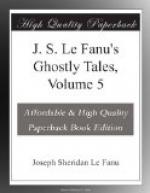His wife sent Mary down to the village, hardly a quarter of a mile away, to implore of the doctor, for whose family she did duty as laundress, to come down and look at her husband, who seemed to be dying.
The doctor, who was a good-natured fellow, arrived. With his hat still on, he looked at Tom, examined him, and when he found that the emetic he had brought with him, on conjecture from Mary’s description, did not act, and that his lancet brought no blood, and that he felt a pulseless wrist, he shook his head, and inwardly thought:
“What the plague is the woman crying for? Could she have desired a greater blessing for her children and herself than the very thing that has happened?”
Tom, in fact, seemed quite gone. At his lips no breath was perceptible. The doctor could discover no pulse. His hands and feet were cold, and the chill was stealing up into his body.
The doctor, after a stay of twenty minutes, had buttoned up his great-coat again and pulled down his hat, and told Mrs. Chuff that there was no use in his remaining any longer, when, all of a sudden, a little rill of blood began to trickle from the lancet-cut in Tom Chuffs temple.
“That’s very odd,” said the doctor. “Let us wait a little.”
I must describe now the sensations which Tom Chuff had experienced.
With his elbows on his knees, and his chin upon his hands, he was staring into the embers, with his gin beside him, when suddenly a swimming came in his head, he lost sight of the fire, and a sound like one stroke of a loud church bell smote his brain.
Then he heard a confused humming, and the leaden weight of his head held him backward as he sank in his chair, and consciousness quite forsook him.
When he came to himself he felt chilled, and was leaning against a huge leafless tree. The night was moonless, and when he looked up he thought he had never seen stars so large and bright, or sky so black. The stars, too, seemed to blink down with longer intervals of darkness, and fiercer and more dazzling emergence, and something, he vaguely thought, of the character of silent menace and fury.
He had a confused recollection of having come there, or rather of having been carried along, as if on men’s shoulders, with a sort of rushing motion. But it was utterly indistinct; the imperfect recollection simply of a sensation. He had seen or heard nothing on his way.
He looked round. There was not a sign of a living creature near. And he began with a sense of awe to recognise the place.
The tree against which he had been leaning was one of the noble old beeches that surround at irregular intervals the churchyard of Shackleton, which spreads its green and wavy lap on the edge of the Moor of Catstean, at the opposite side of which stands the rude cottage in which he had just lost consciousness. It was six miles or more across the moor to his habitation, and the black expanse lay before him, disappearing dismally in the darkness. So that, looking straight before him, sky and land blended together in an undistinguishable and awful blank.




